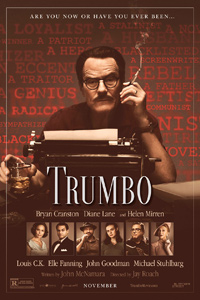 The Brave One: Roach Recapitulates Black List Era Hollywood
The Brave One: Roach Recapitulates Black List Era Hollywood
Examining the past from the safer perspective of our more enlightened period, Jay Roach’s Trumbo is a salutation to famed screenwriter Dalton Trumbo, a man who defied the blacklist following Joseph McCarthy’s witch hunt in Hollywood. Unfortunately the film doesn’t seem worthy of the talented man it’s lionizing. Some might conclude, now more than ever, a remembrance of Trumbo and those brave souls who continue to stand against a corrupt system despite personal losses, are important. But then, one would expect a much more unruly and rebellious film, something harpooning Hollywood’s greedy, superficial sugarcoating rather than just another period send-up. Despite a sympathetic and altogether enjoyable performance from Bryan Cranston, Roach dithers around with a host of stereotypes and clichés, presenting mimicry of cinematic golden days sporting a cavalcade of caricatures not unlike Sacha Gervasi’s similarly styled Hitchcock (2012).
In 1947 Hollywood, celebrated screenwriter Dalton Trumbo (Cranston) is blacklisted for his political beliefs, along with a cadre of other creative voices in the community. Known as the ‘radical’ voice of the infamous Hollywood Ten, Trumbo was the highest paid screenwriter at the time, but suddenly finds himself out of work after being subpoenaed to testify in front of HUAC while celebrities like gossip columnist Hedda Hopper (Helen Mirren) and American icon John Wayne (David James Elliott) crusaded actively against him. Since the studios would no longer hire him, he is forced to sell his home and move his family and wife Cleo (Diane Lane) to a smaller house after serving an eleven month prison sentence because he refused to answer questions from Congress. Unable to utilize his talents in any other way, Trumbo accepts minimum salary to write scripts for the King Brothers Studio (Stephen Root, John Goodman), films that will never bear his name. Thanks to his talent, the lowly studio’s output finds the quality of its trashy genre fare much improved, and thus Trumbo finds a way to support his family for the next thirteen years until unprecedented success at the Oscars brings Kirk Douglas knocking, desperate for a re-write on the blockbuster that would come to be Spartacus (1960).
Focusing specifically on Trumbo and his martyrdom, Roach builds a creaky tune about good old fashioned American heroism and the incredible difficulties involved when one individual challenges the crushing system. But Trumbo’s story, despite his impressive talent, is also an anomaly, as tangential snippets involving Trumbo’s colleagues Arlen Hird and Ian McKellan Hunter prove. Without a certain amount of clout, involving considerable financial reinforcement to weather the eye of the storm as well as emotional consideration on the home front, defying the system alone is usually impossible. And Roach’s Trumbo seems reluctant to convey a portrait of his family’s sacrifice. You’d hardly know times were tough at home if it weren’t for moments spent on teen daughter Niki’s rebellious streak, with Elle Fanning upstanding co-star Diane Lane as her supportive (one note) mother.
Without a doubt, the film’s successful approximations of the man and the period rests on Cranston’s abilities, not unlike Roach’s casting of Julianne Moore in Game Change, the television film depicting the 2008 US Republican campaign. An inspired leading performer tends to help us overlook the caricatures sprinkled throughout the substantial supporting cast. Less known personalities, such as the screenwriters portrayed by Louis C.K. and Alan Tudyk, or the skid-row studio heads played by Stephen Root and John Goodman, are at an advantage. But Dean O’Gorman as Kirk Douglas and Christian Berkel as Otto Preminger are obnoxious. As the disgraced Edward G. Robinson, Michael Stuhlbarg also only manages a vague approximation of a career forever tainted by trading in his dignity to reinvigorate his career.
Helen Mirren as vile gossip columnist Hedda Hopper (a personality soon to be resuscitated again by Tilda Swinton in the next Coen Bros. film) is rendered with all the general brushstrokes of a pampered monster, and along with David James Elliott as John Wayne, Roach teases at the latent Anti-Semitism lurking in the mission statement of the witch hunt meant to sweep Communism out of Hollywood. Much like the film’s more comedic moments, when Trumbo manages to snag two Oscars while operating an underground ring of script doctors and ghost writers through the B movie machine of the unscrupulous King Brothers studio, these uneven tones suggest Roach had a hard time determining what kind of a film Trumbo should be.
Something much more cohesive would be Peter Askin’s 2007 documentary of the same name since Roach only manages to mount a moderately attractive television version of these events. All of the right elements are depicted, how patriotism was used as euphemism for the same tactics allowing for fascism, the ruthless vacuum of an industry fueled by creativity but only interested in profit, and yet Trumbo always feels cookie cutter. George Clooney’s accomplished portrait of broadcast journalist Edward R. Murrow in 2005’s Good Night, and Good Luck more aptly conveyed the cynical, impossible reality of a dark age. In Trumbo, Jim Denault’s cinematography evokes the pleasurable scent of nicely polished wood finish.
Exposes on Hollywood remain an oxymoron, kind of like biting the hand that feeds you. Roach plays it safe, portraying a man whose reputation has been restored, his memory honored. We’re ready for touchier subjects, like the sore spot of Elia Kazan, or, finally, a film version of David McClintick’s Indecent Exposure documenting the scandal regarding Columbia Pictures head David Begelman and the ruination of Cliff Robertson’s career for whistleblowing.
★★½/☆☆☆☆☆


